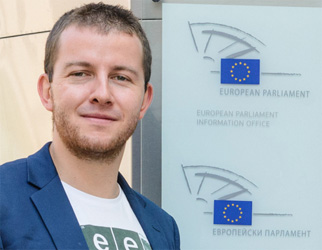A simulation of the decision-making process and legislative procedure in the EU “Model European Union” took place in Blagoevgrad, March 27-29. 108 university students from 22 countries, among them USA, Germany, France, Morocco, Ukraine took part in the conference “Regulation of immigration policy in the EU”, organized by the European Society Club at the American University in Blagoevgrad.
The Friedrich Naumann Foundation, the American University in Bulgaria and the European Parliament Information Office in Bulgaria were the event’s main partners.
 “The Model EU simulation is a European practice in over 20 member countries,” says Boyko Blagoev from the EP Information Office in Bulgaria. “The idea is to simulate the legislative procedure between the Council of the EU and the European Parliament so that students may be able to gain experience by stepping into the shoes of MEPs or ministers. The participants also distributed the roles of journalists and lobbyists amongst themselves. The students chose to focus on the EU’s immigration policy as it is a big problem for all countries, not just for Bulgaria.”
“The Model EU simulation is a European practice in over 20 member countries,” says Boyko Blagoev from the EP Information Office in Bulgaria. “The idea is to simulate the legislative procedure between the Council of the EU and the European Parliament so that students may be able to gain experience by stepping into the shoes of MEPs or ministers. The participants also distributed the roles of journalists and lobbyists amongst themselves. The students chose to focus on the EU’s immigration policy as it is a big problem for all countries, not just for Bulgaria.”
The conference opened with a discussion panel “Deficiency in EU´s migration policy - Benefits of a proactive approach”, organized by the Friedrich Naumann Foundation.
“Antoaneta Assenova, assistant to Bulgarian Alliance of Liberals and Democrats for Europe MEP Filiz Hyusmenova joined us for this panel from Brussels,” Boyko Blagoev goes on to say. “During the simulation we discussed problems which are in the focus of attention of the European Parliament as well as of the Council of the EU. We talked about asylum, about the procedures for granting asylum to some of the people entering the member states, about relations between the citizens in the receiving countries and the refugees, about the situation in Bulgaria. The students really did step into the shoes of politicians and the simulation was very real. They discussed the measures that can be taken to improve things in Bulgaria and across the EU. And the same things happened during the simulation as in Brussels. For example citizens are able to follow the debates at the EP live via the Internet, and the same thing happened in Blagoevgrad. The students elected a president of the European Parliament. There were representatives of different political groups from different countries. They formed committees to discuss legislative drafts. There was voting, negotiations between cabinet ministers from different countries, members of the Council and the people representing the citizens i.e. MEPs. It was interesting to watch as they took on the role of European politicians. I believe that they found this exercise really useful because it enables them to put into practice something they have only learnt in theory right away and to put forward ideas of their own.”
Boyko Blagoev from the European Parliament Information Office in Bulgaria says he firmly believes that the ambitious students from the American University in Blagoevgrad will do their best to make the Model EU a traditional event.
English version: Milena Daynova
Bulgarians go to the polls today to elect 240 members of the 51st National Assembly. Nineteen parties and nine coalitions are registered to take part in the elections. A total of 4 858 candidates - 3 480 men and 1 378 women - are vying for a seat in..
Today, 26 October, has been declared a day of election silence in Bulgaria ahead of the snap elections for the 51st National Assembly. On this day, voters can reflect and decide how to vote. Since April 2021, this is the seventh early parliamentary..
The seventh election campaign in the political marathon of the past three years is drawing to a close. Have we heard any ideas for a way out of this crisis? Have the no longer surprising news of vote-buying attempts, which once again failed to reveal the..
Pro-Russian candidate takes lead in first round of presidential election in Romania In a shock development, independent far-right, pro-Russia..

+359 2 9336 661
